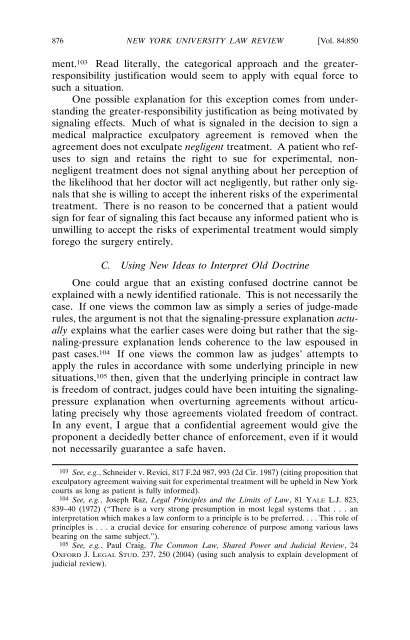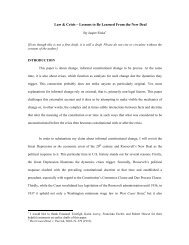In Search of an Enforceable Medical Malpractice Exculpatory
In Search of an Enforceable Medical Malpractice Exculpatory
In Search of an Enforceable Medical Malpractice Exculpatory
Create successful ePaper yourself
Turn your PDF publications into a flip-book with our unique Google optimized e-Paper software.
876 NEW YORK UNIVERSITY LAW REVIEW [Vol. 84:850<br />
ment. 103 Read literally, the categorical approach <strong>an</strong>d the greaterresponsibility<br />
justification would seem to apply with equal force to<br />
such a situation.<br />
One possible expl<strong>an</strong>ation for this exception comes from underst<strong>an</strong>ding<br />
the greater-responsibility justification as being motivated by<br />
signaling effects. Much <strong>of</strong> what is signaled in the decision to sign a<br />
medical malpractice exculpatory agreement is removed when the<br />
agreement does not exculpate negligent treatment. A patient who refuses<br />
to sign <strong>an</strong>d retains the right to sue for experimental, nonnegligent<br />
treatment does not signal <strong>an</strong>ything about her perception <strong>of</strong><br />
the likelihood that her doctor will act negligently, but rather only signals<br />
that she is willing to accept the inherent risks <strong>of</strong> the experimental<br />
treatment. There is no reason to be concerned that a patient would<br />
sign for fear <strong>of</strong> signaling this fact because <strong>an</strong>y informed patient who is<br />
unwilling to accept the risks <strong>of</strong> experimental treatment would simply<br />
forego the surgery entirely.<br />
C. Using New Ideas to <strong>In</strong>terpret Old Doctrine<br />
One could argue that <strong>an</strong> existing confused doctrine c<strong>an</strong>not be<br />
explained with a newly identified rationale. This is not necessarily the<br />
case. If one views the common law as simply a series <strong>of</strong> judge-made<br />
rules, the argument is not that the signaling-pressure expl<strong>an</strong>ation actually<br />
explains what the earlier cases were doing but rather that the signaling-pressure<br />
expl<strong>an</strong>ation lends coherence to the law espoused in<br />
past cases. 104 If one views the common law as judges’ attempts to<br />
apply the rules in accord<strong>an</strong>ce with some underlying principle in new<br />
situations, 105 then, given that the underlying principle in contract law<br />
is freedom <strong>of</strong> contract, judges could have been intuiting the signalingpressure<br />
expl<strong>an</strong>ation when overturning agreements without articulating<br />
precisely why those agreements violated freedom <strong>of</strong> contract.<br />
<strong>In</strong> <strong>an</strong>y event, I argue that a confidential agreement would give the<br />
proponent a decidedly better ch<strong>an</strong>ce <strong>of</strong> enforcement, even if it would<br />
not necessarily guar<strong>an</strong>tee a safe haven.<br />
103 See, e.g., Schneider v. Revici, 817 F.2d 987, 993 (2d Cir. 1987) (citing proposition that<br />
exculpatory agreement waiving suit for experimental treatment will be upheld in New York<br />
courts as long as patient is fully informed).<br />
104 See, e.g., Joseph Raz, Legal Principles <strong>an</strong>d the Limits <strong>of</strong> Law, 81 YALE L.J. 823,<br />
839–40 (1972) (“There is a very strong presumption in most legal systems that . . . <strong>an</strong><br />
interpretation which makes a law conform to a principle is to be preferred. . . . This role <strong>of</strong><br />
principles is . . . a crucial device for ensuring coherence <strong>of</strong> purpose among various laws<br />
bearing on the same subject.”).<br />
105 See, e.g., Paul Craig, The Common Law, Shared Power <strong>an</strong>d Judicial Review, 24<br />
OXFORD J. LEGAL STUD. 237, 250 (2004) (using such <strong>an</strong>alysis to explain development <strong>of</strong><br />
judicial review).
















